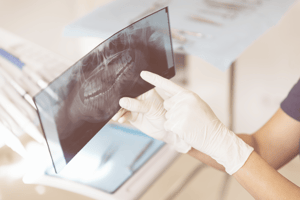 Dental X-rays are images of your teeth that capture the interior of your teeth and gums that are not visible to the naked eye. This can help your dentist identify problems like cavities, tooth decay, bone loss, and impacted teeth. Thus, dental X-rays are just as important as your regular teeth cleanings as they allow your dentist to find and treat dental problems early on before they become more serious.
Dental X-rays are images of your teeth that capture the interior of your teeth and gums that are not visible to the naked eye. This can help your dentist identify problems like cavities, tooth decay, bone loss, and impacted teeth. Thus, dental X-rays are just as important as your regular teeth cleanings as they allow your dentist to find and treat dental problems early on before they become more serious.
What problems can dental X-rays detect?
Dental X-rays are taken to detect:
- Decay that is not visible to the dentist, such as between teeth
- Decay below an existing filling
- Infection in the bone
- Developmental abnormalities
- Periodontal disease
- Certain types of tumors
- Bone loss that accompanies gum disease
- Abscesses and cysts
- Impacted wisdom teeth
Dental X-rays also assist in the preparation of dental implants, braces, dentures, or other dental procedures.
What are the different types of X-rays?
There are four common types of dental x-rays, and each captures different aspects of teeth.
- Bitewing X-rays show both the upper and lower teeth and are used to identify cavities or periodontal disease.
- Periapical X-rays provide the view of the entire tooth, from root to crown. This type of X-ray is used to observe a specific area of concern, such as when you have a toothache.
- Occlusal X-rays capture the floor of the mouth to show how the upper and lower teeth line up. This type of X-ray is typically used to track a child's teeth development.
- Panoramic X-rays capture all of the lower and upper teeth, the jaw, and sinus area. This type of X-ray is usually used for orthodontic treatment or dental implants, but also can identify impacted teeth, jaw disorders, cysts, and tumors.
How often should dental X-rays be performed?
Everyone's oral health is different, and the frequency at which you get dental X-rays depends on several factors, including:
- Your age
- Your oral health history
- Your current oral health
- Any symptoms of oral disease
Generally, if you have good oral health, performing dental X-rays once every one to two years should suffice.
If you are a new patient and don't have X-rays from a previous dentist, you would need to undergo dental X-rays, so that your new dentist can see the full picture of your oral health.
What are the risks of dental X-rays?
Although dental X-rays do involve radiation, the exposure is extremely low. Dental X-ray machines are designed to reduce radiation, and with new technology, like digital X-rays, radiation exposure is further reduced. In addition, when dental X-rays are taken, the dentist will place a lead apron on you, to shield your body and keep radiation exposure to a minimum.
In summary, it's important to get dental X-rays performed to diagnosis and treat issues early on, which can potentially safe you money and unnecessary discomfort in the future, and help keep your teeth healthy and strong for a lifetime.
If you have any questions about dental X-rays, or experience any pain or changes in your mouth, schedule a consultation with us by calling our office at (925) 703-7093 or request a consultation online.


.jpg?width=712&name=GSD-Scalloped-Tongue-Causes-and-Treatment-Blog-01.27.2210.21.21%20(1).jpg)











.jpeg?width=425&name=GSD-How-to-Combat-Dental-Plaque-07.22.24-2%20(1).jpeg)



